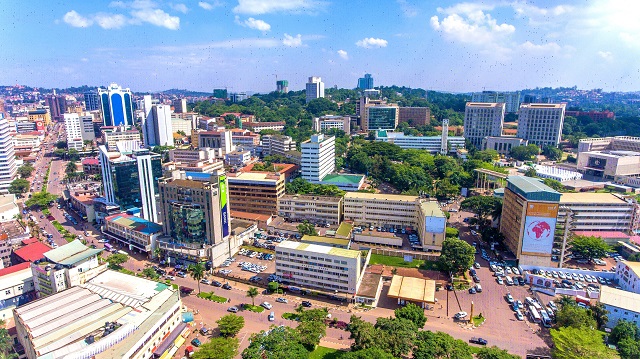
Sue buildings as proceeds of corruption and let somebody who thinks otherwise prove it wrong
Kampala, Uganda | THE INDEPENDENT | The Deputy Director of Public Prosecution Charles Elem-Ogwal is seeking a forceful lifting of the veil to ownership of buildings suspected to be built with proceeds of corruption.
Ogwal who noted difficulties in prosecution of criminal cases and getting convictions due to lack of good forensics under the current conviction based on asset recovery policy said that the solution lies under the non-conviction asset recovery regime where countries follow proceeds of crime.
“For example these shiny sky-scrapers standing in the middle of Kampala, instead of trying to investigate…you sue that building…you say, you building standing here you are a proceed of corruption and let somebody who thinks otherwise prove it wrong,” he explained.
Ogwal says that once this step is taken, then people with an interest in such buildings have to come out to declare proof of ownership and source of income. He says that if adopted by Uganda, the policy can create a big impact in the fight against corruption so that nobody benefits from its proceeds.
Ogwal was part of a panel discussion during the launch of the fourth National Integrity Survey Report, 2019 by the Inspectorate of Government- IG on Thursday. The survey focusing on corruption and mal-administration carried out in conjunction with Uganda Bureau of Statistics –UBOS, comes 13-years since the country last carried out a national integrity survey.
According to UBOS Executive Director Chris Mukiza, the survey was conducted in 2020 covering 15-sub regions comprising 128 districts. Uganda Radio Network-URN learnt that a total of 5,100 households were surveyed and the findings established that corruption is on the increase. Mukiza says that the results are not surprising and display a true picture in the country that should be decisively dealt with.
Some of the findings of the survey show that the public ranked bribery, solicitation and nepotism as the most common forms of corruption at 47 percent, 18 percent and 10 percent respectively. The least ranked forms of corruption was impersonating public figures, illicit enrichment, causing financial loss and false or fraudulent accounting, which all reported less than 1 percent of the respondents.
Vincent Fred Ssenono, the UBOS Principal Statistician in-charge of Methods and Analysis says that greed or the need for quick money was highlighted as the main driver of corruption. The other forms of corruption in the survey are embezzlement, diversion of a public resource, forgery, conflict of interest, withholding information, extortion, favouritism and others.
The survey also highlights the Uganda Police Force in general as the institution where corruption is most frequent. This is followed by Traffic Police, Criminal Investigations and Intelligence Directorate (CIID), Courts of Law, Land offices, Public Health Facilities, District Service Commissions and Agriculture Extension Services.
Julius Twinomujuni, the Deputy Director CIID says that sometimes it’s the public who initiate the bribes especially in traffic offences. He however said that this does not make the vice right since they have on several occasions investigated culprits and prosecuted the suspects.
George Bamugemereire, the Deputy IGG also noted that it was time for anti-corruption agencies to be bold and link wrongdoing of individuals in a particular institution to their top leaders.
Cissy Kagaba, the Executive Director of the Anti-Corruption Coalition Uganda (ACCU) says there is a need for government agencies to always take action when the public report cases of corruption. She says that acting and feedback to the public is important if public confidence is to be won.
Some of the recommendations about the public in regard to corruption are amending the law to provide for harsher punishment of the corrupt, introducing ethics and integrity at an early stage in the education cycle, increasing supervision for public servants and others.
*****
URN
 The Independent Uganda: You get the Truth we Pay the Price
The Independent Uganda: You get the Truth we Pay the Price



